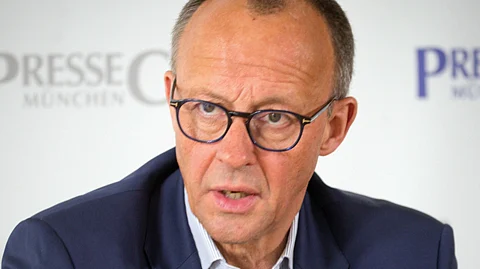

German Chancellor Friedrich Merz hosted Danish Prime Minister Mette Frederiksen at the Federal Chancellery in Berlin on Wednesday, with discussions centering on Russia’s war in Ukraine, migration policy, and global trade tensions.
Addressing recent Russian attacks on Ukraine, Merz warned that Moscow poses a threat to the entire NATO alliance. “Russia is a risk to security on both sides of the Atlantic,” he said, ahead of the upcoming NATO summit in The Hague. The chancellor emphasized that allies would discuss a “historic” increase in defense spending in response to the Kremlin’s aggression.
“We will strengthen the European pillar of NATO together,” Merz declared.
Frederiksen echoed his stance, calling for rapid reinforcement of Europe’s defenses. “We have to rebuild our European defense industry—and of course, German industry is key for us,” she said. “Rearm Europe, do it fast.”
The leaders also aligned on migration, advocating for tighter EU asylum rules. “We cannot accept everyone who wants to come to Europe. It has to be a democratic decision who enters our societies,” Frederiksen stated.
Merz praised Denmark’s migration policies as “exemplary” and confirmed joint efforts to implement stricter EU regulations. If necessary, he added, legal frameworks would be adjusted to facilitate migrant repatriations.
Global trade instability, exacerbated by U.S. President Donald Trump’s tariffs, featured prominently in the talks. Merz welcomed a new U.S.-China trade deal and expressed hope for similar agreements to ease transatlantic tensions.
The leaders also dismissed Trump’s renewed interest in purchasing Greenland, a Danish territory. “The inviolability of borders is enshrined in international law and non-negotiable,” Merz asserted.
Frederiksen firmly rejected the idea, stating, “The future of Greenland can only be decided by the Greenlandic people.” She added that while Trump appeared serious about the proposal, “so are we.”
Both leaders emphasized the close ties between Germany and Denmark, describing each other as “allies and friends” committed to supporting Ukraine and tightening sanctions against Russia. Merz also highlighted plans to deepen energy cooperation, including in hydrogen projects and grid development.
Frederiksen’s visit underscored a shared vision on critical geopolitical challenges, reinforcing the two nations’ strategic partnership.